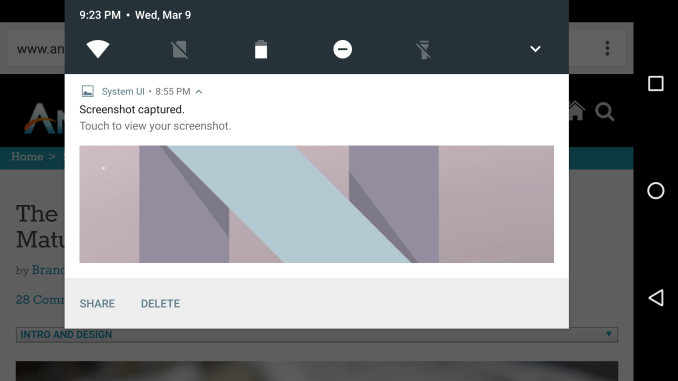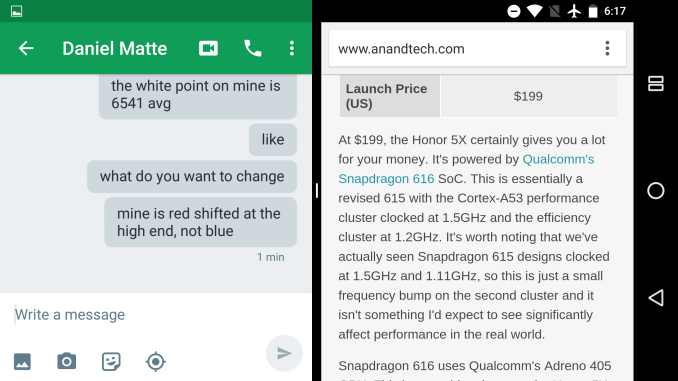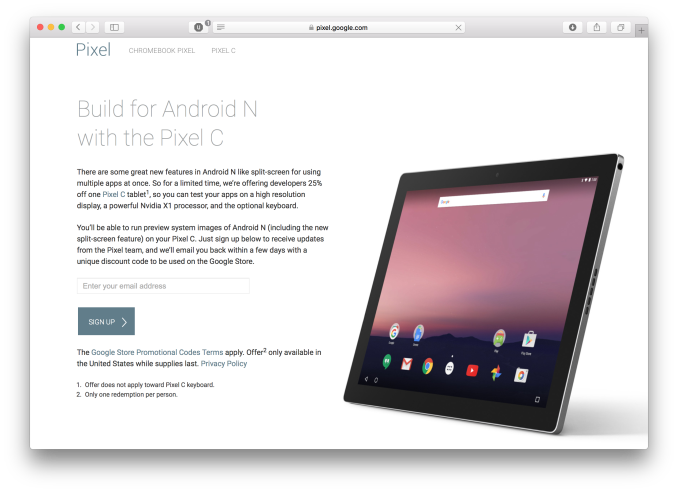Hands-On With the Android N Developer Beta: Multi-Window & More
by Brandon Chester on March 10, 2016 8:00 AM EST- Posted in
- Smartphones
- Android
- Mobile
- Tablets
Initial Impressions
Though I suspect it's not a popular opinion, I have long felt that the software design ecosystem for Android tablets has been stuck in a rut since the early days, and as a result users have struggled to find good, modern applications that really excel at the tablet experience. Android N can't magically bring proper tablet interfaces to all Android apps, but the Multi-Window support is a big help in improving the situation. With split windows in use, on a standard tablet you're really dealing with a screen segmented into two areas, and this is where a phone layout works pretty well. With that in mind, it does help to address the problems that Android tablets currently face, but I do hope that developers will continue to maintain existing tablet UIs, and that new developers will take the time to create ones. I don't know if Google's internal app development groups are prepared for this, but I have faith in the larger Android's developer community.
It's worth noting that the Multi-Window mode technically also works on phones. That said, unless you have a 6.8" phone (which is practically a tablet), I don't think the feature is very useful, but it's there. Even on the Nexus 6 there's just not enough screen space, and I would never use it myself. That said, while I was initially ttempted to recommend that Google just remove the feature on phones, on reflection it doesn't really hurt anyone to have it there for users that want it. On top of that, leaving it to tablets alone may cause some developers to just not support the feature entirely.
Google also has an advantage with Android apps already being designed to support many resolutions and aspect ratios. Several apps that I tried already worked with the split screen mode, and developers aren't going to have to rebuild their UIs like they did when Apple introduced split screen multitasking on iOS. In fact, it's most certainly the case that there are more apps that work with Android N's multitasking than there are that work with multitasking on the iPad, and considering that the feature just launched today in a beta OS I'd say that's a big win for Google and for Android.
If I were to make any recommendations for Google, it would be to make it a bit more obvious to the user that you can hold down the multitasking button inside an app to instantly get into split view mode. I happened to come across it because I figured that Google would have implemented some sort of quick access method, but it's not obvious enough for your average user. In addition, I think the current method of simply filling the view with the background color as you adjust the ratio between apps is not very aesthetically pleasing. These apps still aren't really designed to adjust their UI in real time, and although it's somewhat lame to just blur it out like Apple does on iOS, it looks better than watching the UI frantically try to fill the space.

Quick toggles are easier to access in Android N
As for Google's other changes, I think they're in line with what we've come to expect. After Lollipop, Google was able to step back and focus on the lower level problems with their platform, particularly regarding efficiency. The improvements to Doze will certainly have an impact on energy usage, and blocking apps from waking up in large numbers whenever the phone goes on or off of WiFi is a smart move. I expect that we'll see continued improvement of this sort in future Android releases, as problems with energy management are potentially the biggest problem plaguing the platform right now, with performance and usability having been mostly sorted out. These releases also provide a way for Google to make small improvements to areas like notifications and their built in applications to make the user experience a lot better through many little changes.
On that note, I'm sure many of our more technical readers are interested in being part of the beta. I'm very happy that Google has taken the necessary steps to make the process of enrolling in the program much easier for developers and users. Right now the supported devices include the Pixel C, Nexus 9, Nexus 5X, Nexus 6, Nexus 6P, and Nexus Player. To enroll your device in the beta you can visit this link and your device will quickly notify you that an update is available. It does need to be reiterated that this is a developer beta and a true beta at that - it's not a large-stage end-user beta - but I would encourage enthusiasts who do enroll to consider sending some feedback to Google about what they like and what could be improved, as that's ultimately what these beta programs are all about.
One last thing to note is Google's incentive for developers to test their apps on tablets so they can ensure proper Multi-Window support. For a limited time developers can sign up here to get a promo code which will knock 25% off the cost of the Google Pixel C. With Google recently having patched the most serious bugs on the Pixel C, for $375 it's a pretty good tablet and a very good device for doing application testing considering the fact that the Android N beta only works on two tablets. Interested developers can sign up here, and Google is seemingly taking people on faith that they really do intend to use the unit for development as it only involves entering your email address.
With Android N being in its early stages, I must say that I'm impressed with the stability and usability of the features that Google has added. With Google IO on the horizon we'll certainly be hearing more about what's coming in Android N, and I'm very excited about the direction Google is headed in.












124 Comments
View All Comments
BenSkywalker - Friday, March 11, 2016 - link
Tablets sold over 200 million units globally in 2015- wherever you got your numbers, they aren't even close.https://www.idc.com/getdoc.jsp?containerId=prUS409...
michael2k - Friday, March 11, 2016 - link
I was looking at a quarterly report by Gartner, which will show seasonal variance not seen in an annual report. The Gartner report was also focused on tablet-hybrids and detachable PCs (they call them ultramobile PCs), which is a smaller subset of the tablet space. I thought that relevant because I was comparing PCs to tablets that would replace PCs.lilmoe - Thursday, March 10, 2016 - link
Windows tablets *will* dominate. It's just a matter of time.michael2k - Friday, March 11, 2016 - link
I wouldn't bet either way. They certainly didn't defeat Android, iOS, nor BB before dwindling to its current state in phones!Hyper72 - Saturday, March 12, 2016 - link
Ah yes, I remember people saying that about Microsoft Pocket PC in 2000, then Windows Mobile, then MS Smartphone later, etc. etc.Markets can and do change ofcourse, it could happen. Having said that I like both Android and iOS, I use both and have versions of the same apps on them. However Windows on tablets is still an uncomfortable hybrid, just like Windows 10 on my PC have both a classic and a modern control panel with different settings.
raptormissle - Saturday, March 12, 2016 - link
They said the same about windows phone and look where that is now. All of the new apps come out on Android and iOS. Windows isn't even a factor and never will be.trane - Thursday, March 10, 2016 - link
Meh, the multitasking is not up to scratch with Windows 10, or even 8.1. Microsoft has really nailed it with the arbitrary scaling, UWP apps scale wonderfully no matter what you do with them. Even desktop apps usually play well in tablet mode.raptormissle - Thursday, March 10, 2016 - link
Yeah, lets compare a desktop OS to a mobile OS. Microsoft never nailed anything besides being the worlds largest vector for viruses, malware and ransomware.lilmoe - Thursday, March 10, 2016 - link
The good part about it is how people like you get angry at how Microsoft is doing a much better job making a "desktop OS" do tablet stuff better than any other "tablet OS", and more fluidly and intuitively so...I've installed Windows 10 on an Atom based Acer tablet with 2GB of RAM and 32GB of MMC storage. I was astonished on how much more fluid and responsive the *full version* of Windows 10 runs on hardware far less superior than last years iOS and Android tablets. Battery life was stellar. It's not even a comparison. Tablet Mode takes the tablet experience to a whole new level.
Oh, and Windows 10 won't be suffering from planned obsolescence. If the latest RS1 Insider build is any indication, it's just going to get faster with each major update.
Again, don't worry, Windows 10 dominating tablets is just a matter of time.
raptormissle - Thursday, March 10, 2016 - link
I like it when Windows people feel threatened about Android. It brings out their true character. It must be hard for Microsoft to come to grips that the OS they once sold and made billions from is now a commodity OS. Android sure pulled the rug out from under them. But, then what would you expect from a company that didn't even see the Internet coming. And now they're scrambling to give their products away and put them on any platform they can just to stay relevant. Microsoft is a has been and the lack of developer support for their platform is just another nail in their coffin. Those idiots once marched around carrying an iPhone coffin when they heralded the arrival of Windows phone. Little did they know it was their own coffin they were carrying.Windows tablets are good for nothing but running old windows apps on.